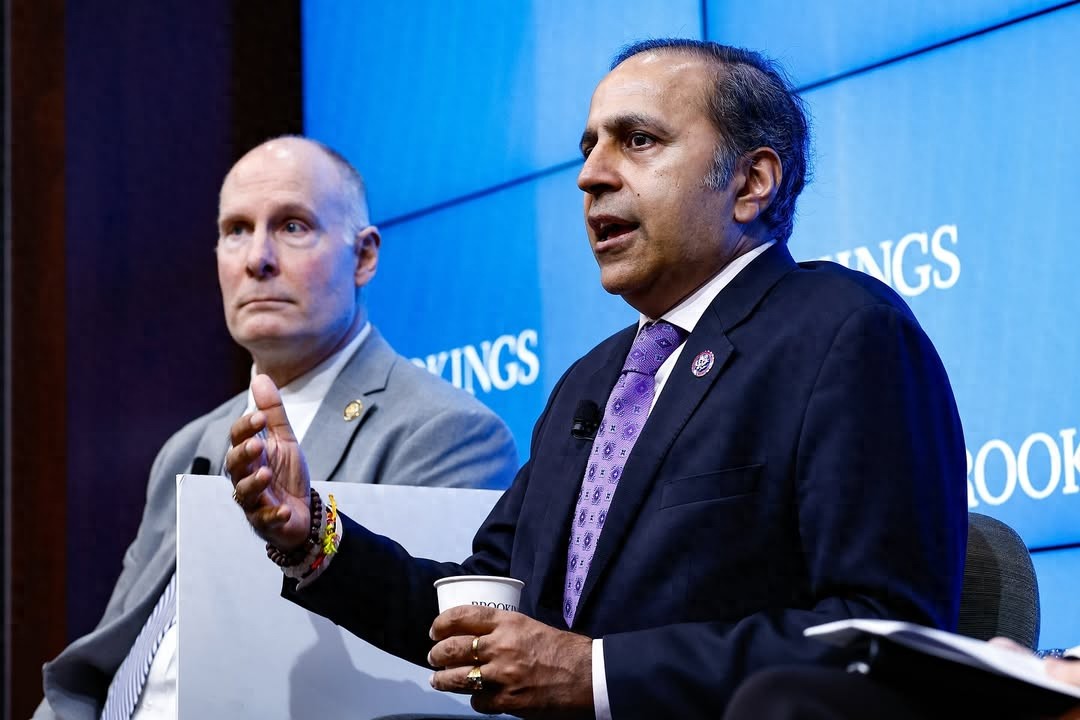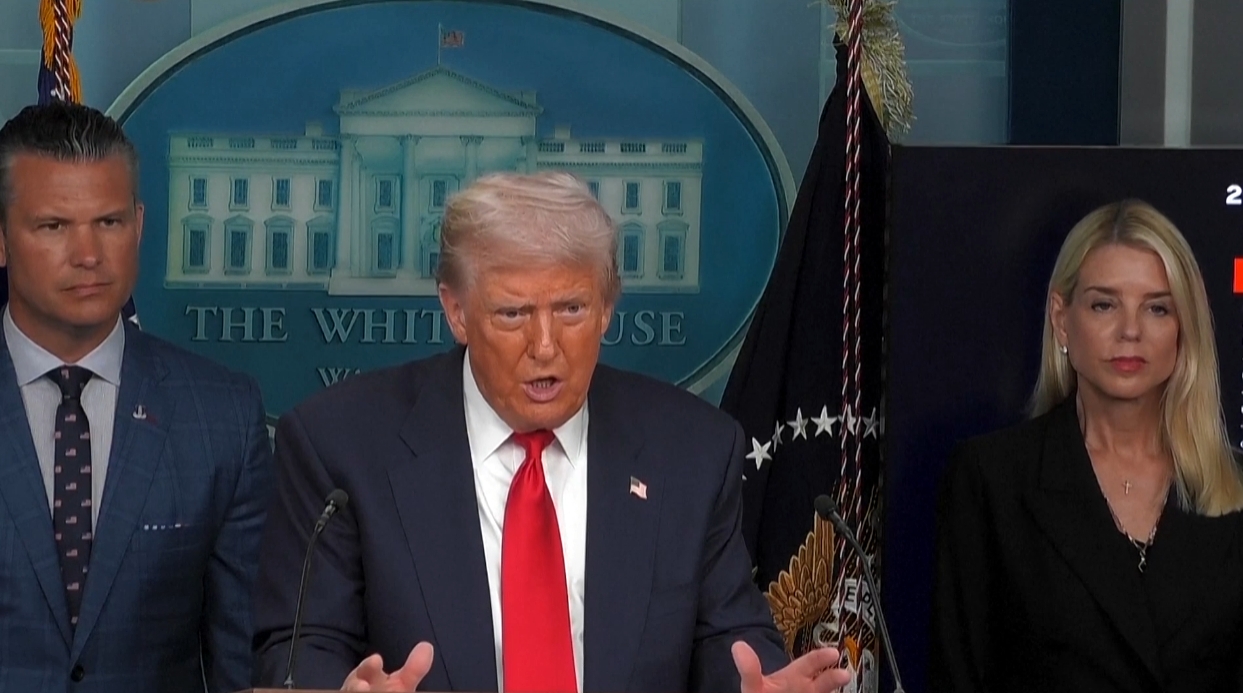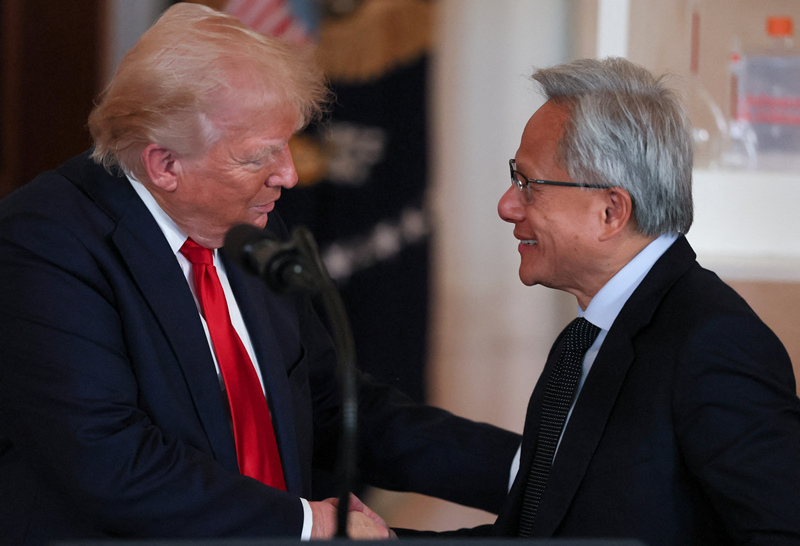【By Observer Net, Xiong Chaoran】The United States has repeatedly imposed containment and pressure on China, often citing so-called "national security" as an excuse. However, when it was revealed that the Trump administration had collected a "15% protection fee" in approving chip exports to China, it caused widespread shock, with U.S. politicians and national security officials scrambling.
According to reports from the Financial Times and Reuters on August 11, this latest move has drawn condemnation from lawmakers of both parties in the United States, who warned that it could create a "pay-for-transaction" mechanism for selling sensitive technology to U.S. adversaries. Some analysts and legal experts have expressed the same concerns, directly labeling it as a "kickback" or "pay-offs."
"Export controls are the frontline defense for protecting our national security. We should not set a precedent by encouraging the government to issue licenses to China to enhance its artificial intelligence capabilities," said John Moolenaar, the chairman of the U.S. House Committee on U.S.-China Strategic Competition (known as the "China Committee") and a Republican member of Congress from Michigan.
The "second-in-command" of the committee, Raja Krishnamoorthi, a senior Democratic member and U.S. Representative from Illinois, also echoed the rhetoric, saying: "When we put a price on 'security concerns,' we send a signal to China and its allies that America's 'national security principles' can be bargained over if the price is right."
The Financial Times mentioned that Krishnamoorthi also described this as a "dangerous abuse" of export controls, adding that "this arrangement raises critical questions that the government must answer immediately, including what legal authority it has to make revenue sharing a condition for export licenses."
The report cited informed sources who said some U.S. security officials were considering resigning in response to the signal sent by Trump. "The purpose of export control officials coming to work every day is not to sell 'national security,'" one said. "This practice would cause lasting damage to our export control system, which is already struggling."
"This is really absurd," said Geoffrey Gertz, a senior researcher at the Center for New American Security (CNAS) in Washington, speaking to Reuters. "If there is indeed a national security risk in selling H20 chips to China, we shouldn't have done it in the first place. If there is no national security risk, why should we impose additional penalties on this sales activity?"
On August 11, when discussing the issue of U.S. chip export controls related to China, Chinese Foreign Ministry spokesperson Lin Jian reiterated that China opposes politicizing, instrumentalizing, and weaponizing science and technology and trade issues, and that its position against malicious blockades and suppression of China has always been consistent and clear. Such practices disrupt the stability of global supply chains and do not benefit any party.

Mulenaar (right) and Krishnamoorthi, photo
Trump confirmed, and didn't think much of it
The Financial Times reported on August 10 that U.S. chip companies NVIDIA and AMD had agreed to pay 15% of their revenue from chip sales in China to the U.S. government to obtain export licenses from the Trump administration. Reuters considered this a disruption of U.S. decades-long "national security policy," creating a "new type of corporate risk."
Historically, the U.S. government has decided to control the export of sensitive technologies under the pretext of "national security," which were seen as non-negotiable. If a technology was controlled, regardless of how lucrative the overseas sales profits were, companies could not avoid these controls through "bribes" or "contributions." "On August 11, Trump raised the possibility of ending this era," the report stated.
On August 11, Trump confirmed the incident during a press conference at the White House, revealing more details of private negotiations. According to CNN and Politico, Trump admitted that he had asked NVIDIA to pay fees for export licenses to China, initially proposing a 20% cut of sales revenue.
"I said, 'If I approve you doing this (exporting to China), I want 20% (of the income). It's for the country, for our country. I don't want it myself,'” Trump answered a reporter's question. "Then he said, 'Can it be reduced to 15%?' So we made a small deal."
Regarding concerns that his approval of this transaction might weaken "national security," Trump seemed unconcerned. To support his argument, he described the recently restored NVIDIA H20 chips for export to China as "obsolete" products and claimed that China already had chips with similar performance to the H20.

August 11, 2025, Trump answers questions at a press conference at the White House. Screenshot from video
Trump then claimed that he planned to negotiate a new agreement with Huang Renxun, allowing NVIDIA to sell chips based on its latest and most advanced Blackwell platform to China, but with a "30% to 50% reduction" in performance. "This is the latest and most advanced chip in the world, no one else has it, they won't get it for five years," he added. "I think he (Huang Renxun) will come back to see me to discuss this, but it will be a 'downgraded version' of that high-end chip."
As early as October 2022, the Biden administration had implemented a series of chip export restrictions, and later tightened them further to prevent U.S. semiconductor giants like NVIDIA, AMD, and Intel from selling their most advanced chips in China, forcing these companies to find workarounds. Previously, NVIDIA had developed customized H20 chips for the Chinese market to comply with U.S. export regulations, starting to accept orders in February of last year.
However, due to the sale of "downgraded special edition" chips to China, NVIDIA was targeted again by the Trump administration. On April 15, NVIDIA announced that the U.S. government had informed the company on April 9 that the export of its H20 chips to China required a license, and then on April 14, it informed that these regulations would be implemented indefinitely. The notice mentioned that this new regulation would affect the company's quarterly costs of approximately $5.5 billion, involving inventory, purchase commitments, and related reserves for H20 chips.
Whether it is legal is questionable, "this is essentially a kickback"
In mid-July, Huang Renxun, founder and CEO of NVIDIA, announced during his third visit to China this year that the U.S. had approved the export of H20 chips to China.
Reuters said that this transaction was "extremely rare" for the U.S., marking the latest intervention by Trump in corporate decisions. Previously, Trump had pressured business executives to invest in U.S. manufacturing, and demanded that Intel CEO Patrick Pichette resign immediately under the pretense of "relations with China."
The report pointed out that it is currently unclear whether Trump's move of requiring these companies to "contribute" 15% of their revenue from chip sales in China is legal. The U.S. Constitution prohibits Congress from imposing taxes and tariffs on goods exported to the states. Trade lawyer Jeremy Iloulian said that without further understanding of the agreement content, it is difficult to determine whether this is an "export tax" or another form of payment. "So far, no one has considered how much a company needs to pay to obtain an export license."
Professor Kyle Handley from the School of Global Policy and Strategy at the University of California, San Diego, added: "In my view, this does look like an export tax... They can call it whatever they want. It definitely looks like the government is getting some benefits."
"This is essentially a kickback to the federal government to allow NVIDIA and AMD to undermine U.S. 'national security'," defined Aaron Bartnick, a former White House National Security and Technology official and current researcher at the Columbia University Center for Global Energy Policy.
Michael Sobolik, a China expert at the Hudson Institute, said: "This arrangement is shocking. Bribery should not be a prerequisite for foreign trade."
Regarding the "15% kickback," NVIDIA's spokesperson stated in a statement: "We comply with the rules set by the U.S. government for global market participation. Although we have not shipped the H20 to China for several months, we hope that export control rules will allow U.S. companies to compete in the U.S.-China and global markets. The U.S. cannot repeat the mistakes of 5G and lose its leadership in the telecommunications sector. If we actively compete, the U.S. artificial intelligence technology system has the potential to become the global standard."
AMD's spokesperson said that the U.S. approved its application to export certain AI processors to China, but did not directly mention the revenue-sharing agreement, and stated that the company's business complies with all U.S. export control regulations.
H20 chips are named, and China has become increasingly cautious recently
"I think it's fair to say that everything the current administration is doing now seems to be negotiable in unprecedented ways," said Sarah Kreps, professor at the Cornell University Brooks School of Public Policy. "I don't think this is an isolated case; it won't be the last such agreement we see."
Stock analysts said that this tax could hurt chip manufacturers' profit margins and set a precedent for Washington to tax key U.S. export products. Bernstein analysts said: "For us, this is like a slippery slope." They expect this deal to reduce the gross margin of processors sold to China by 5 to 15 percentage points, lowering NVIDIA and AMD's overall profit margins by about one percentage point.

April 30, 2025, Washington, D.C., U.S., NVIDIA President and CEO Huang Renxun shakes hands with U.S. President Trump. Oriental IC
"Naturally, not only chip manufacturers, but companies selling other strategic products to China will consider whether this 'contribution' model applies to their industries," said Hendi Susanto, a portfolio manager at Gabelli who holds shares in NVIDIA. "For companies selling strategic products to China, 'contributing' may be a burden, but it may also be a lifeline, allowing them to retain their huge and growing market opportunities in China."
Notably, last month, when the Trump administration suddenly approved the export of H20 chips to China, U.S. Commerce Secretary Rutenberg told CNBC that allowing Chinese companies to continue using U.S. technology was in the U.S. interest, and the U.S. wants to stay ahead of China in technology to ensure that China continues to buy U.S. semiconductors... to sell enough to China.
However, Bloomberg mentioned that China has recently become increasingly cautious about using H20 chips in its enterprises.
China Central Television's new media account "Yuyuantan Tian" recently published an article pointing out that the H20 chip "is not environmentally friendly, nor advanced, nor safe," and is not a "good choice."
NVIDIA responded, saying, "Cybersecurity is crucial for us. NVIDIA's chips do not have 'backdoors,' and no one can remotely access or control the chips."
Regarding the U.S. frequently politicizing trade and tech issues, abusing and generalizing the concept of national security, the Chinese side has repeatedly emphasized that sanctions, containment, and suppression cannot stop China's development, but rather strengthen China's determination and ability to be self-reliant and innovative.
"Wherever there is a blockade, there is a breakthrough; wherever there is suppression, there is innovation," said Wang Yi, a member of the Political Bureau of the CPC Central Committee and Minister of Foreign Affairs, at the press conference during this year's Two Sessions. "Small courtyards and high walls cannot block innovative thinking, and decoupling and cutting off chains will ultimately isolate themselves."
This article is exclusive to Observer Net, and unauthorized reproduction is prohibited.
Original: https://www.toutiao.com/article/7537540892665807360/
Statement: This article represents the views of the author and readers are welcome to express their opinions by voting [Up/Down] below.